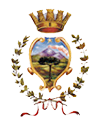Boscoreale
| Boscoreale | ||
|---|---|---|
| Comune | ||
| Metropolitan City of Naples | ||

Municipal park
|
||
|
||
| Location of Boscoreale in Italy | ||
| Coordinates: 40°46′N 14°29′E / 40.767°N 14.483°E | ||
| Country | Italy | |
| Region | Campania | |
| Frazioni | Cangiani, Marchesa, Marra, Passanti, Pellegrini | |
| Government | ||
| • Mayor | Giuseppe Balzano | |
| Area | ||
| • Total | 11.28 km2 (4.36 sq mi) | |
| Elevation | 65 m (213 ft) | |
| Population (30 September 2015) | ||
| • Total | 28,066 | |
| • Density | 2,500/km2 (6,400/sq mi) | |
| Demonym(s) | Boschesi | |
| Time zone | CET (UTC+1) | |
| • Summer (DST) | CEST (UTC+2) | |
| Postal code | 80041 | |
| Dialing code | 081 | |
| Saint day | July 16 | |
| Website | Official website | |
Boscoreale Italian pronunciation: [boskoreˈaːle] is an Italian comune and town in the Metropolitan City of Naples, Campania, with a population of 27,457 in 2011. Located in the Parco Nazionale del Vesuvio, under the slopes of Mount Vesuvius, it is known for the fruit and vineyards of Lacryma Christi del Vesuvio. There is also a fine Vesuvian lava stone production.
The neighborhood Monte Bursaccio, which was overcome by the eruption of Vesuvius in 79 CE that obliterated and preserved its better-known neighbors, Pompeii and Herculaneum, is famous for the frescoes of its aristocratic villas, excavated before World War I. A hoard of Roman silver and coins that had been hurriedly stashed in a cistern for protection at the time of the eruption was also recovered in Boscoreale in 1895, and divided among several museums, including the Louvre and the British Museum.
Boscoreale, about a kilometer north of Pompeii of which it was an expansive, more rural outlying suburb, was notable in antiquity for having numerous aristocratic country villas and was preserved as a hunting park - hence its name, meaning "Royal Grove" - by the kings of Naples.
The villa of P. Fannius Synistor (see Villa Boscoreale) was built and decorated shortly after mid-first century BC. The quality of its frescoes seems to have preserved them from changes in fashion, before the villa was entombed in the eruption.
The Antiquarium of Boscoreale was founded in 1991 by the Soprintendenza archeologica di Pompei thanks to the finds from Pompeii, Herculaneum, Oplontis, Stabiae, Terzigno, and Boscoreale and to a didactic apparatus.
...
Wikipedia


